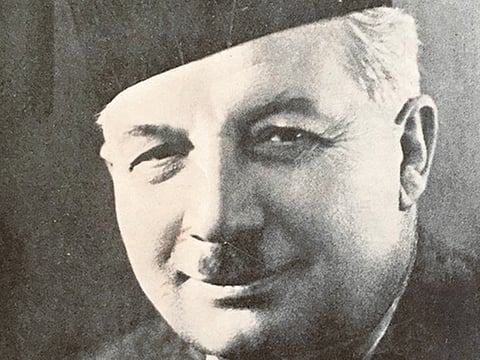Riad Al Solh: A founding father with a vision
Early on Al Solh realised Lebanon’s survival was possible only if its Muslim and Christian population was united

Beirut: At the height of the great Syrian Revolution and amid heavy casualties throughout the region, Riad Al Solh, one of Lebanon’s founding fathers, understood how to mitigate foreign machinations.
As a die-hard nationalist, he confronted serious challenges, signed the Covenant (Mithaq Al Watani) with Lebanon’s first Maronite president in 1943, became the Sunni leader who assumed his responsibilities to secure independence and build a state, and sacrificed his life to preserve his country’s constitution.
Al Solh rejected the Sykes-Picot agreement because it dismembered the Arab provinces of the Ottoman Empire — even if Jamal Pasha hanged most of the Arab nationalists who could have saved it — and recognised how the Balfour Declaration gave Palestine to the Zionists, the British betrayed the Arab Revolt, the French destroyed the Hashemite Faisal I’s Arab Kingdom, and how both Paris and London imposed their reviled mandates.
He became prime minister and represented the voice of consensus in Beirut and, between 1943 and 1948, championed the representative system more than anyone else in the nascent republic.
At a time when Lebanon faced an internal power struggle that even shocked President Bishara Al Khoury’s brother-in-law, the constitutionalist Michel Chiha, especially after Al Khoury wished to alter the charter and seek a second term, Al Solh believed that a confessional Lebanon was compatible with his own adherence to Arabism.
The son of Reda Al Solh, a reforming Qa’imaqam (sub-governor) in Nabatiyyah and in Saida and a prominent nationalist Arab leader who was tried by Ottoman forces in 1915 and exiled to Izmir, Riad Al Solh was elected head of the government of Saida after the defeat of the empire. The French opposed his rise to prominence but the young man was already on his quest to secure freedom from the occupying power. He was periodically jailed by France throughout the 1930s. He returned to Beirut from Rashayyah with other founding fathers on November 22, 1943, a free man in an independent country.
His genius was to accept that Lebanon’s Christian and Muslim populations could only thrive in a strong alliance, which agreements like Sykes-Picot intended to prevent, even if few realised that the country’s very existence was the result of the fatidic accord. Where Al Solh rose to the occasion was to absorb the need to learn how to live with freedom just as most nationalists and the surviving founding fathers learnt how to die for it.
From 1943 to 1951, Al Solh persuaded the Lebanese to disentangle the concept of freedom as applied to a country from the concept of freedom as applied to people. He firmly believed that “being a citizen of an independent country did not always make one a free man”, but that “only human rights and democracy” ensured that awakened citizens deserved to enjoy the fruits of their labour. He confided to family members that such blessings did not materialise through government decrees only but “should be implemented by all shareholders” — the people of Lebanon.
To be sure, the Covenant he backed provided that the Muslim community would not press for unification with other Arab states and that Christians would recognise the Arab dimension of Lebanon and not ally themselves with any Western power. In this way, the post- Sykes-Picot Lebanon guaranteed its sovereignty in the Arab world and reconciled its two basic orientations — to the Christian West and the Muslim East.
Al Solh (1898-1951) died on July 17, 1951, in Amman, Jordan, under the bullets of a Syrian Social Nationalist Party assassin which was widely considered an act of revenge for the trial and execution of SSNP’s Antoun Saadeh, a die-hard Arab nationalist who opposed the idea of separating Lebanon from Syria.
Sign up for the Daily Briefing
Get the latest news and updates straight to your inbox


